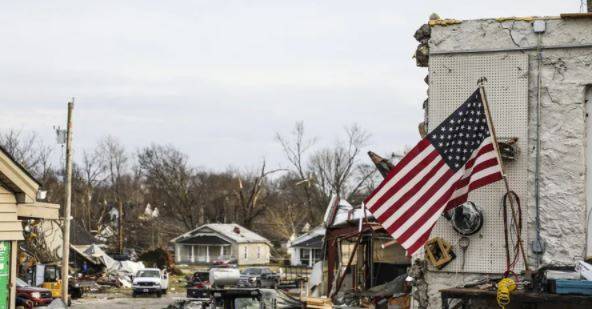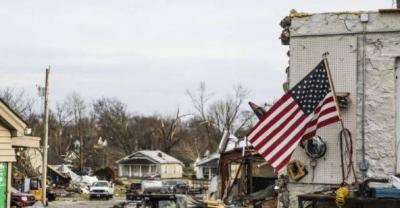Eighty-three people were killed on Saturday during a series of tornadoes that struck the Midwest and Southern United States, which resulted in demolished homes and flattened commercial buildings, in a tragedy described by U.S. President Joe Biden as "unimaginable." American officials have expressed concerns that at least 100 people may have lost their lives in Kentucky. The powerful tornadoes, which meteorologists say are unusual in the colder months, destroyed a candle factory and swept through a nursing home in Missouri, killing six workers at an Amazon warehouse in Illinois.
Kentucky Governor Andy Beshear stated that the series of tornadoes was the most destructive in the state's history. He noted that 40 workers were rescued from the candle factory in Mayfield, which had about 110 people inside when it became a pile of rubble, and that finding anyone else alive in the debris would be a "miracle."
Beshear mentioned that 189 National Guard members were deployed to assist in the rescue efforts, which would heavily focus on Mayfield, a town of around 10,000 residents in the southwestern part of the state.
In a somber comment, Biden declared that the tornadoes that struck parts of the United States were "one of the largest waves of tornadoes in our history," following the devastation witnessed in five states. He stated in televised comments, "It’s a tragedy. We still don’t know the full extent of the casualties and the scope of the damage," pledging to send federal aid to the states affected by the storms.
Biden pointed out that federal disaster response agencies had already begun deploying to the field and noted that an emergency had been declared in Kentucky, with the possibility of other areas following suit if requested by the governors of the affected states.
The U.S. President expressed his intention to travel to Kentucky but emphasized that he did not want to "disrupt" relief operations. He asserted that climate change makes weather "more extreme," without specifying the direct link between climate change and the disaster that occurred on Friday evening. He said, "The truth is we all know that everything is more extreme when the climate is warmer, everything," adding, "It's clear this has some impact here, but I can't give you a read on how much."




